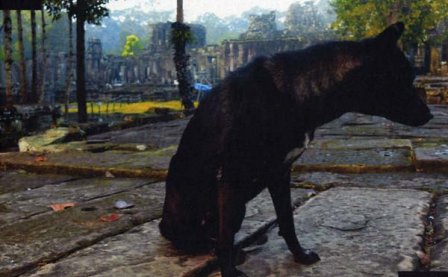Much of the loud music we value as forward-thinking or cool — black metal, doom, shoegaze, drone, noise — concerns itself with being ‘monolithic.’ The sound that exits the amps of sunn 0))) or Earth comes at its audience in an undifferentiated mass like hot, moist air hitting a mountain range or, I dunno, the locust swarm scene from Days of Heaven. Production choices in the more stylish strains of metal tend toward the homogenizing and bedimming, with blast beats becoming nearly indistinguishable from vocal gurgling and guitars surging like acid reflux. In live performance, musicians stand there cloaked, fogged, or visually unimportant. In short, individual players become subordinate to the singular stream of sound. Rhys Chatham’s “guitar orchestras” or Boredoms’ “Boadrum” projects typify this tendency, throwing recognizable members of other ensembles into a massive concretion of sound. It becomes a sort of anti-jazz, an extrapolation, perhaps, of the punk aversion to soloing where the sounds that we hear don’t originate in the minds and bodies of free-willed individuals but sort of coalesce in an amplified cloud above their heads.
Music like this triggers descriptors like “elemental” or elicits comparisons to drug use. Its grand appeal emerges from some sense of being beyond the human, or even beyond the physical (hence Liturgy’s much-pilloried “transcendental black metal”). Maybe this comes as a function of volume, amplification, and the limits of human hearing. Enough noise, or loud enough noise from a single source, registers as a single entity, a big bulbous thunderhead. It takes on a certain physicality as it causes Jurassic Park ripples in glasses of water and rattles ribcages. And it’s a natural direction to go in — there’s a certain muddiness to live rock ‘n’ roll in all its less sanitized incarnations that might as well be exploited. But we should be careful about letting that ‘monolith’ mindset dominate the way we listen to loud music.
The initial impression created by Imikuzushi, the most recent collaboration of the Justice League (or perhaps Crime Syndicate) of experimental music that is Jim O’Rourke, Keiji Haino, and Oren Ambarchi, is one of mass and solidity, as we’re dropped in medias res into a full noise-rock wallop. Especially viz-à-viz 2010’s Tima Formosa, which even at its most oblique possessed a certain airy headspace to it, it seems for that initial jarring moment as though that vaporousness has sublimed into something solid and irreducible. Awareness of the sunn 0))) connection (Stephen O’Malley, an old friend, actually did the cover design here) only strengthens the illusion. Sure, it sounds a hell of a lot closer to those guys than it does to, say, O’Rourke’s pop dime museum The Visitor, but we shouldn’t let that momentary impression of inhuman hugeness distract us from a record on which these three greats have transformed themselves into something like a more razor-edged, rhythmically unmoored Can.
Here, more than on any previous collaborative release, we can hear these three individually great players at work: O’Rourke worming his bass around the undercroft of the record, Ambarchi laying icy cymbal hits down one moment then wailing on his kit the next, and Haino filling the headspace with viscous guitar tone and Pentecostally-charged vocals. While their sensibilities cohere with tightness and purpose, there’s nothing groupthink-y or inhuman about it. Countless moments in each of these four excerpts of live improv can easily be traced back to one member of the trio. Both schizo sides of Haino — most clearly distinguishable on his two 2005 Black Blues records, on which he rendered the same six blues covers first in crooning languor and then in convulsive yowls and bare shocks of cacophony — show up to the party this time. In the almost Robert Wyatt-ish first passage of “ready and waiting ready and tired of waiting this happiness hovers for a while opaque…” he timidly warbles over heavily reverbed jazz chords then, 10 minutes later, conjures ruined Babels of dissonant treble. The gelid eloquence of Ambarchi’s solo work reins in the initial build of “invited in practically drawn in by something facing the exit of this hiding place who is it? that went in…” while O’Rourke’s palpitating bass lends the track a pop propulsion.
While it’s tempting now and then to look at the effect of this record as somehow mountainous, geologic, or monolithic, this is intensely human music. A closer listen yields a sensation familiar to anyone who’s ever driven the jungle roads of the Yucatan; what seem at first to be oddly pointed hills, or perhaps the work of extraterrestrials, reveal themselves to be Mayan pyramids cloaked over with soil and brush. Therein lies the greatest joy of Imikuzushi: the moment at which the structures of pop vernacular, of human creation, of jazzish digression emerge from the contours of an initially forbidding and alien musical landscape.
More about: Keiji Haino / Jim O'Rourke / Oren Ambarchi




